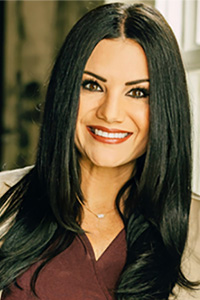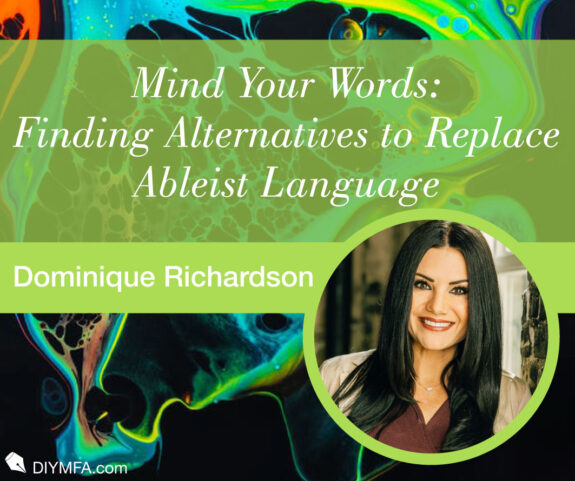Content warning: This article mentions and discusses offensive words related to people with disabilities, while offering alternatives to prevent using ableist language in the future in your writing.
Wow! That’s “crazy,” I can’t believe that happened. This event was so “lame.” She was “blind” to his ways, and he ended up taking advantage of her. I told him not to do it, but my warning fell on “deaf ears.”
Sounds like something you might overhear in a casual conversation, surely nothing derogatory intended by the speaker, right? But take a closer look. You might be surprised to learn there are words within this speech that are actually harmful to a whole population of people in our society.
What I’m talking about here is something called “ableist language.” There are words people use every day without the intention of harming anyone, but nonetheless end up being derogatory and perpetuating negative stereotypes about an entire population in our society.
And when you are writing in the young adult space, it’s important to learn about this topic in order to remove any ableist language you may unwittingly use.
So What is Ableist Language?
Ableist language is defined by dictionary.com as “words and phrases that devalue disabled people by using disability language or historical descriptions of disabilities as an insult.” In addition to this, the definition continues to include the way you speak about people with disabilities, treating it as something “to be pitied or disabled people as inspirational when they overcome a disability.”
But you might ask, what if I didn’t mean it as an insult? The thing is, just because you might not be aware of how the word is an insult to the disabled population, that doesn’t mean it isn’t still potentially harmful and perpetuating these negative stereotypes. That is why it’s so important to learn about this, and to grow and correct moving forward.
If you’re like me, when I first learned of ableism, I was shocked to learn I had unknowingly used words that could be hurtful to others. And the next thing I wanted to know was how do I fix this, because I didn’t want to make this mistake again. Like Arundhati Roy, the author of A God of Small Things, said, “The trouble is that once you see it, you can’t unsee it. And once you’ve seen it, keeping quiet, saying nothing, becomes as political an act as speaking out. There’s no innocent. Either way, you’re accountable.”
I wanted to be accountable and be a positive force for change. As a writer of young adult novels—or really a writer for any population of readers—it’s critical we get this right and be the example steering language in a more inclusive direction.
Four Tips on How to Avoid Ableist Language
Avoiding ableist language is important to make your novels inclusive and respectful of people with disabilities. Here are some tips to help you avoid ableist language:
1. Avoid using disability-related words as insults or negative descriptors.
Words like “crazy,” “insane,” “lame,” “blind to the facts,” and “deaf to my needs” are examples of using disability-related words as negative descriptors or insults. These words can be hurtful and reinforce negative stereotypes about people with disabilities. Instead, use specific language that accurately describes what you mean.
2. Use person-first language.
Person-first language emphasizes the person first, not the disability. For example, instead of saying “disabled person,” say “person with a disability.” This puts the focus on the person, not their disability.
3. Avoid assuming people with disabilities are helpless or pitiable.
People with disabilities are capable and strong, and it’s important to avoid reinforcing the stereotype that they are helpless or pitiable. Avoid writing about characters with disabilities solely in terms of their disability or portraying them as objects of pity or charity.
4. Research and consult.
If you’re writing about a character with a disability that you’re not familiar with, it’s important to research and consult with people with disabilities to get an accurate portrayal. Avoid relying solely on stereotypes or media representations of people with disabilities.
Alternative Words or Phrases to Replace Some Common Ableist Language and Phrases
It helps to have alternative phrases to pull from. Here are some examples of ableist language and alternative words or phrases you can use instead:
- “Crazy” — Instead of using this word, “wild,” “outrageous,” or “unbelievable.”
- “Insane” — Use words like “unreasonable” or “absurd” instead.
- “Tone deaf” — Try another a word like “insensitive” or “out of context.”
- “Lame” — Instead of using this word to describe something as bad or uncool, use words like “unimpressive” or “unappealing.”
- “Blind to” — Instead of using this phrase to describe someone who is not aware of something, use words like “unaware” or “ignorant.”
- “Deaf to” — Instead of using this phrase to describe someone who is not listening to something, use words like “unresponsive” or “unyielding.”
- “Mute” — Instead of using this word to describe someone who can’t speak, use the phrase “nonverbal.”
- “Wheelchair-bound” — Instead of using this phrase to describe someone who uses a wheelchair, use the phrase “uses a wheelchair.”
- “Suffering from” — Instead of using this phrase to describe someone with a disability or illness, use the phrase “living with” or “has.”
For a comprehensive list of ableist language and alternative words, check out this blog created by disability justice advocate Lydia Brown, titled Ableism/Language.
The great news is, there are so many alternatives for language that are potentially harmful. By becoming aware and putting in a reasonable effort, we can make our writing a safer place for all people to feel seen, heard, and valued.

Dominique Richardson is the coauthor of The Everbeach Series—a young adult, romantic suspense series full of forbidden romance, deadly twists, and scandalous secrets that will keep you turning pages into the night. The first book in the series, Red as Blood, comes out February 28, 2023. Passionate about all things books and giving back to the community, she is also the Executive Director and cofounder of YA by the Bay, a nonprofit young adult reading and leadership festival, dedicated to inspiring teens to “be the author of your own life.” Raised between Jamaica and the United States, her biracial heritage finds a home in her books. She spends her free time passing on her love of unicorns to her twin boys, running in the Florida heat, and drinking all the coffee. She now lives in Tampa, Florida with her family.She would love to connect with you! Find her online on Instagram, Twitter, and TikTok. If you’d like to stay in the know about her upcoming book releases, sign-up for her email list. To learn more about the YA by the Bay Young Adult Book Festival, check out the website.







